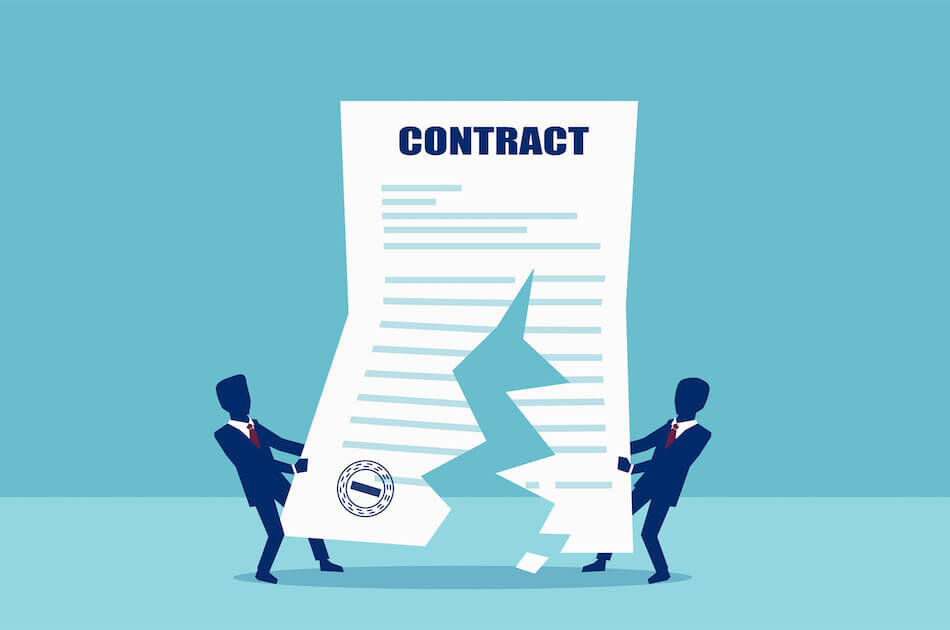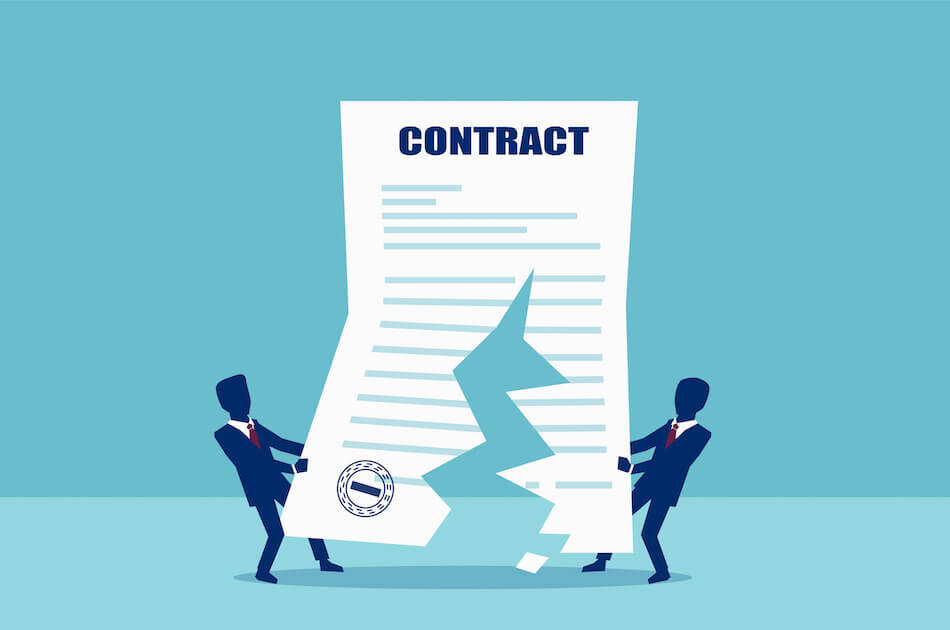 Yes, sellers can back out of deals even after accepting an offer. But they need good reasons. Let’s look at when it’s legal during a real estate transaction, why sellers try to cancel, and how they can avoid legal trouble when backing out of a sale agreement.
Yes, sellers can back out of deals even after accepting an offer. But they need good reasons. Let’s look at when it’s legal during a real estate transaction, why sellers try to cancel, and how they can avoid legal trouble when backing out of a sale agreement.
For informational purposes only. Always consult with an attorney, tax, or financial advisor before proceeding with any real estate transaction.
Get a Cash Offer on Your Home With Cash Is King.
Want to skip the hassle of selling your home? We’ll make you a Guaranteed Cash offer. Get started now for free!
Quick Points on a Seller Backing Out
- Sellers can legally cancel during attorney review (usually 3-5 days), before signing the purchase and sale agreement, or if the buyer doesn’t meet specific conditions in the real estate contract.
- Sellers who cancel for non-legal reasons could face lawsuits from the potential buyer and have to pay thousands in damages, including the buyer’s legal fees.
- If a seller wants to cancel a deal, they should talk to a real estate attorney or legal professional right away.
When Sellers Can Legally Walk Away
Sellers need valid reasons to cancel a deal. The real estate contract both parties signed controls what they can and can’t do. Seeking legal advice from a real estate attorney helps sellers understand their options before making any moves.
Good reasons to back out of a closed deal include specific conditions in the purchase contract, like not finding another home to buy. Understanding what’s in the home purchase agreement helps sellers avoid legal complications.
Before Signing the Final Contract
Sellers can back out any time before signing the purchase agreement. The law says real estate deals must be in writing and signed by everyone to be legally binding. Until then, even after the seller accepts verbally, they’re free to cancel the home sale.
This stage gives sellers one last chance to make sure they’re happy with the purchase price and all other terms in the real estate contract. Smart sellers use this time to talk through any concerns with their real estate attorney before committing to the sale agreement.
During Attorney Review (3-5 Days)
The attorney review period gives both sides time to think about the deal. It usually lasts 3-5 days after the seller accepts an offer. During this time, sellers can change their mind without penalties by sending a legal notice.
This short window lets sellers have their real estate attorney check the purchase and sale agreement and back out if something doesn’t look right. Smart real estate investors know to wait until this period ends before getting too excited about a property.
If The Buyer Doesn’t Meet the Contract Conditions
After signing the contract and having it reviewed, sellers can still back out if the buyer doesn’t meet certain conditions in the purchase contract. Common examples include:
- Buyer fails to secure financing
- The seller can’t find another home by a certain date
- Issues with the home inspection that the parties can’t agree how to fix
These conditions protect sellers from being forced to complete the real estate transaction when things don’t go as planned. A real estate attorney can help sellers understand exactly what contingencies in the purchase agreement give them a legal way out without breaching the contract.
Why Sellers Want to Back Out (But Legally Can’t)
Sellers often want to cancel deals for reasons that aren’t legally valid once they’ve signed. These include getting better offers, feeling emotional about the home, or life changes. But backing out for these reasons can lead to lawsuits and damaged reputations.
Knowing these common reasons helps sellers prepare for the emotional side of selling. They need to think carefully about the consequences before trying to cancel a valid contract.
Someone Offered More Money
One of the biggest temptations is getting a higher offer after already accepting one. This happens when another potential buyer swoops in with a better purchase price or better terms. Sellers might be tempted by the extra cash or higher market value.
But this is a HUGE RISK. Canceling a legally binding purchase contract just to take more money from another can lead to lawsuits. Sellers might have to pay the buyer’s legal fees, lost home inspection costs, and even more in damages. The financial hit could be way more than the extra money from the new offer.
Emotional Attachment to the Home
Sometimes sellers get cold feet because they love their home too much. The emotional ties to a house can make it hard to let go, especially after accepting an offer makes the sale feel “real.”
This attachment can make it tough to negotiate repairs or accept that someone else will live in their home. But emotions alone aren’t a legal reason to cancel a contract.
Life Circumstances Changed
Unexpected events like job relocation or loss, health problems, or family emergencies can make sellers reconsider. These situations might change their financial needs or living arrangements.
While these are understandable reasons, they may not be legal grounds to cancel a signed contract. Sellers facing these challenges need to check their contract carefully and talk to an attorney.
Specific Situations When Sellers Can Back Out
Sellers may have legal ways to cancel if certain contract conditions aren’t met. Knowing these escape hatches helps sellers understand when they can legally walk away.
Contract Conditions Not Met
Purchase contracts include conditions that must be satisfied for the home sale to happen. Common ones include:
- Seller finding a new home to buy
- Home passing inspection with no major issues
- The property appraising at or above the purchase price
Other conditions may be added when making counteroffers.
If these conditions aren’t met, sellers can legally cancel without penalties. For example, if a seller can’t find another home before the deadline in the real estate contract, they might have a way out of the sale agreement.
Buyer Can’t Get a Mortgage
If the buyer can’t secure financing or the buyer fails to get approved for a loan, sellers usually don’t have to go through with the sale. This gives sellers protection against potential buyers who can’t actually afford the home.
The financing contingency in most purchase agreements makes this clear. Sellers should check that real estate contracts include this protection and understand how it works before signing the purchase and sale agreement.
This hassle is one reason why many might consider selling for cash instead. No mortgage necessary!
Both Sides Agree to Cancel
If both the buyer and the seller agree to cancel the purchase contract, that’s always legal. While the buyer doesn’t have to agree if the seller asks, a mutual decision to walk away prevents legal battles.
Even with mutual agreement, sellers might still owe their agent a commission depending on their listing agreement. Checking the real estate contract terms with a real estate attorney or legal professional is crucial before seeking this solution.
Legal Problems With the Contract
Issues like fraud or misrepresentation can give sellers grounds to cancel the purchase agreement. If problems come up during attorney review, either side can often walk away legally from the real estate transaction.
Sellers trying to back out just to take a higher offer without a valid reason face serious consequences, including seller breaches of contract claims. Knowing what the real estate contract actually says is essential to avoid legal trouble.
What Happens If Sellers Back Out Without Good Reason?
Backing out without legal justification can cause big problems for sellers. They might face lawsuits and financial penalties.
Sellers need to understand these risks before trying to cancel a valid contract.
The Buyer Could Sue Them
When sellers cancel without cause, the buyer can sue for breach of contract or seek specific performance. The buyer might ask the court to force the sale to go through or to award money for their losses, including the buyer’s legal fees.
Sellers need to be careful and understand that the system generally enforces legally binding purchase contracts. Courts don’t look kindly on seller breaches when they simply changed their minds after accepting an offer.
Financial Penalties Can Be Huge
The financial hit from backing out can be severe. Sellers might have to pay:
- The buyer’s legal fees
- Return the earnest money deposit
- Pay damages for lost time and expenses
- Cover real estate commissions
- Lose market value if property values drop during the dispute
These costs often add up to WAY MORE than any potential gain from backing out of the purchase and sale agreement.
How Sellers Can Minimize Risks When Backing Out
If sellers absolutely must back out, there are ways to reduce the risks. Taking the right steps can help avoid legal battles and minimize financial losses.
Talk to a Real Estate Attorney ASAP
Seeking legal advice is the FIRST step sellers should take. A real estate attorney or legal professional can:
- Explain the legal consequences of breaking the real estate contract
- Review purchase agreement terms to find any valid ways out
- Help navigate the process with minimal legal trouble
This expert guidance helps sellers make informed decisions about the transaction and avoid costly mistakes. Good legal professionals pay for themselves by preventing bigger problems.
Be Honest With the Buyer
Clear communication with the potential buyer helps prevent misunderstandings. Sellers should:
- Explain the situation honestly
- Notify the buyer as soon as they decide to cancel the purchase contract
- Try to reach a mutual agreement about ending the sale agreement
Being transparent about the reasons for backing out can sometimes lead to an understanding between both parties in the real estate transaction without legal action.
Offer Some Money as Compensation
Offering compensation can help smooth things over. This might include:
- Returning the earnest money deposit plus interest
- Paying for any temporary housing the buyer arranged
- Adding something extra for the trouble
This approach can help resolve the situation without a lawsuit and lets both sides move on from the purchase agreement more quickly. Most potential buyers will accept fair compensation to avoid legal battles.
For informational purposes only. Always consult with a licensed real estate professional before proceeding with any real estate transaction.
Back Out of a Contract Carefully
Knowing when sellers can legally back out of accepted offers helps everyone in the real estate process. By understanding the legal grounds, potential consequences, and ways to minimize risks, sellers can navigate these tricky situations more safely.
Every real estate transaction is different, and no matter how fast you want to sell your home, having a clear understanding of the purchase and sale agreement terms is crucial. Getting professional advice from a legal professional, keeping communication open, and approaching each real estate contract carefully helps avoid legal trouble down the road.
Get a Cash Offer On Your Home
No Commission. No Hassle. You pick the closing date.
CashIsKing.com works with cash investors on a daily basis and partners with investors who can deliver quick cash offers on properties of all conditions and locations. Why wait? Get a cash offer from an investor today!
Get a Cash Offer

